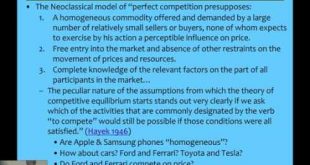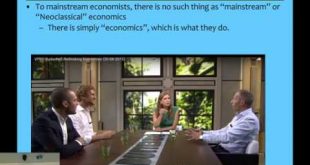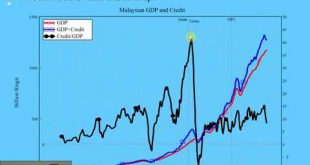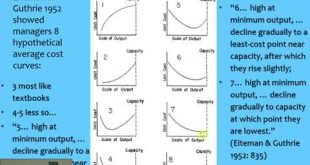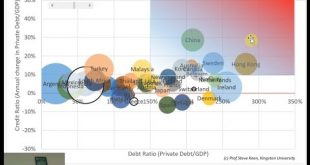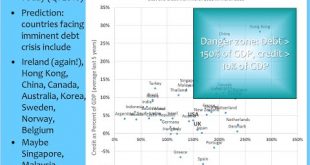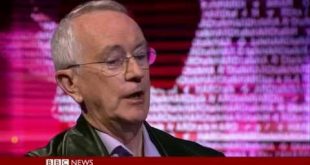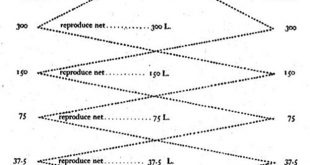The Austrian School shares the same theory of value foundations as the Mainstream, but rejects its use of both equilibrium thinking and equilibrium-oriented mathematical modelling. I cover Hayek, complexity, and the Austrians most Austrians reject, Joseph Schumpeter.
Read More »Kingston 2016 Becoming an Economist Lecture 3: The Austrians (1/2)
The Austrian School shares the same theory of value foundations as the Mainstream, but rejects its use of both equilibrium thinking and equilibrium-oriented mathematical modelling. I cover Hayek, complexity, and the Austrians most Austrians reject, Joseph Schumpeter.
Read More »Kingston 2016 Becoming an Economist Lecture 2: The Mainstream
The first 4 minutes and 42:40 till 52:30 are devoted to administrative and representative issues at Kingston. The rest of the lecture covers the evolution of the "Neoclassical" Mainstream from Walras's puzzle of "Can a set of free markets reach equilibrium in each and every market at once?" to the current criticism of the mainstream by leading Mainstream economists today. NOTE: I didn't record the first lecture of this year's course due to misplacing a necessary cable. If you'd like to see...
Read More »Alternative economics 3: Debt & Credit in Capitalist Economies & using Minsky
(1) The "Smoking Gun of Credit", including graphs for Malaysia and Singapore [Minutes 0-6] (2) Why Credit is a fundamental component of aggregate demand and income [5-19] (3) Designing a monetary model in free Open Source system dynamics program Minsky [19-52] (download from https://sourceforge.net/projects/minsky/) (4) Building a cyclical model in Minsky [52-End]
Read More »Alternative economics 2: Empirical & Logical Fallacies in Neoclassical economics
Neoclassical microeconomics is based, not on "simplifying" assumptions that omit insignificant details of reality to focus on the significant issues, but on "counter-factual" assumptions which flatly contradict what we know about significant economic issues. I cover: (1) Friedman's methodological assertion that "assumptions don't matter" was actually done to advise economists NOT to read empirical literature contradicting the idea of rising marginal cost [Minutes 1-5]; (2) The logical...
Read More »Alternative economics 1: Credit, Islamic Finance, & Preventing Economic Crises
This is the first third of a workshop on alternatives to Neoclassical economics that I gave in Malaysia on October 15 2016, after giving the keynote speech at the Symposium on Islamic Economics & Finance Education. I cover: (1) the recent change in the attitude of mainstream economists to their own models [Minutes 0-12] (2) building macroeconomic models from macroeconomic identities [12-30] (3) Can equity-based lending prevent crises? [[30-38] (4) Some questions INCLUDING "What is a...
Read More »Olivier Blanchard, Equilibrium, Complexity, And The Future Of Macroeconomics
I have observed and appreciated Olivier Blanchard’s intellectual journey over the last decade. It began in August 2008, with what must be regarded as one of the worst-timed papers in the history of economics. In a survey of macroeconomics entitled “The State of Macro”, he concluded, one year after the financial crisis began, that “The state of Macro is good” (Blanchard, 2008). However, Blanchard did not remain locked into that position, and he had the rare intellectual courage to...
Read More »Health Warning! “Realism” virus afflicting mainstream economists
Some papers that are remarkably critical of mainstream economics have been published recently, not by the usual suspects like myself, but by prominent mainstream economists: ex-Minneapolis Fed Chairman Narayana Kocherlokata, ex-IMF Chief Economist Olivier Blanchard, and current World Bank Chief Economist Paul Romer. I discuss these papers in a tongue-in-cheek introduction to another key problems of unrealism in economics--the absence of any role for energy in both Post Keynesian and...
Read More »Steve Keen interview on BBC HardTalk August 2016
Steven Sackur and I discuss why (mainstream) economists shouldn't be trusted, Brexit, the Euro, and overall the need to reform economics a decade after the Global Financial Crisis.
Read More »Incorporating energy into production functions
In my last post on my Debtwatch blog, I finished by saying that the Physiocrats were the only School of economics to properly consider the role of energy in production. They ascribed it solely to agriculture exploiting the free energy of the Sun, and specifically to land, which absorbed this free energy and stored it in agricultural products. As Richard Cantillon put it in 1730: The Land is the Source or Matter from whence all Wealth is produced. The Labour of man is the Form...
Read More » Steve Keen’s Debt Watch
Steve Keen’s Debt Watch


